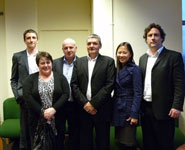William 'Wullie' Beck’s thirty-year fight to clear his name for a conviction he served six years of imprisonment for has culminated in an appeal thanks to work by the University of Bristol Innocence Project (UoBIP). The Scottish Criminal Cases Review Commission announced this week they have referred Mr Beck’s case back to the High Court of Justiciary after agreeing his conviction may be unsafe.
William 'Wullie' Beck’s thirty-year fight to clear his name for a conviction he served six years of imprisonment for has culminated in an appeal thanks to work by the
University of Bristol Innocence Project (UoBIP). The
Scottish Criminal Cases Review Commission announced this week they have referred Mr Beck’s case back to the
High Court of Justiciary after agreeing his conviction may be unsafe.
William Beck was 20 when he was arrested for an armed robbery of a post van in Livingston, Scotland on 16 December 1981. He served six years of imprisonment for his conviction, which was based exclusively on eyewitness identification.
Although Mr Beck claims that he was in Glasgow the entire day at the time of the robbery, some 40 miles away from where the crime occurred, he was convicted on the positive identification of two eyewitnesses despite other witnesses not identifying Mr Beck in an identity parade.
For more than three decades, Mr Beck has steadfastly protested his innocence, claiming that he is a victim of eyewitness misidentification. By the time he sought the assistance of the UoBIP, Mr Beck has made two previous unsuccessful applications to the Scottish Criminal Cases Review Commission and numerous complaints about how the police conducted the identification parade and the conduct of his legal representatives at trial.
The UoBIP took on Mr Beck’s case in 2011 following the Scottish Criminal Cases Review Commission’s provisional Statement of Reasons stating that it was not minded to refer his conviction to the High Court of Justiciary.
Under the guidance of Dr Michael Naughton, postgraduate law students Mark Allum and Ryan Jendoubi at the University of Bristol Law School undertook detailed research into Mr Beck’s case and made two submissions to the Scottish Criminal Cases Review Commission. They contended that a combination of factors rendered a real likelihood of a miscarriage of justice in Mr Beck’s case. In addition to the ‘flimsy nature’ of the eyewitness identification evidence that underpinned his conviction, they argued that the judge had made several serious errors in the way in which he had directed the jury.
In an interview with Good Morning Scotland, Dr Naughton said: “This is a significant moment for Mr Beck. There has been 1,500 cases applied to the Scottish Criminal Cases Review Commission and only about 100 cases have ever been referred. They have agreed with us that a miscarriage of justice may have occurred in Mr Beck’s case and we are delighted that they have referred his case.”
In a public statement posted on a justice forum website, Mr Beck expressed his gratitude to both the Scottish Criminal Cases Review Commission and the UoBIP, stating that “he had ’no doubt whatsoever’ that it was the UoBIP that convinced the Scottish Criminal Cases Review Commission to refer his case”.
Media coverage about William Beck's appeal can be viewed on the University's
'In the Media' section.
Further information
The University of Bristol Innocence Project (UoBIP)
The University of Bristol Innocence Project (UoBIP), the first innocence project in the UK, is an extra-curricular pro bono legal clinic which teaches law through working on real cases of alleged wrongful convictions. Established in January 2005 by Dr Michael Naughton, the UoBIP undertakes thorough and objective investigations into cases of alleged victims of wrongful conviction who have exhausted the normal appeals process and legal aid with the aim of ascertaining the validity of their claims of innocence. Intensely supervised by academic staff and assisted, where appropriate, by forensic scientists and criminal appeal lawyers, the UoBIP assists those who are found to be potentially innocent by making applications and submissions to the Criminal Cases Review Commission or the Scottish Criminal Cases Review Commission to support a referral of the case back to the Court of Appeal (in England and Wales) or the High Court of Justiciary (in Scotland) The UoBIP is also the founding member of the Innocence Network UK (INUK) which has actively supported the establishment of 34 innocence projects based in universities across England, Scotland and Wales.
Dr Michael Naughton is a Reader in Sociology and Law with joint appointments in the Law School and the School of Sociology, Politics and International Studies (SPAIS), University of Bristol. He has specialised in the area of wrongful convictions for over a decade and has written extensively on the subject. He is the Founder and Director of the University of Bristol Innocence Project (UoBIP), through which he directs student investigations into real cases of alleged wrongful convictions. He is also the Founder and Director of the Innocence Network UK (INUK) which he established in September 2004 to facilitate casework, research and communications in the area of wrongful convictions.

